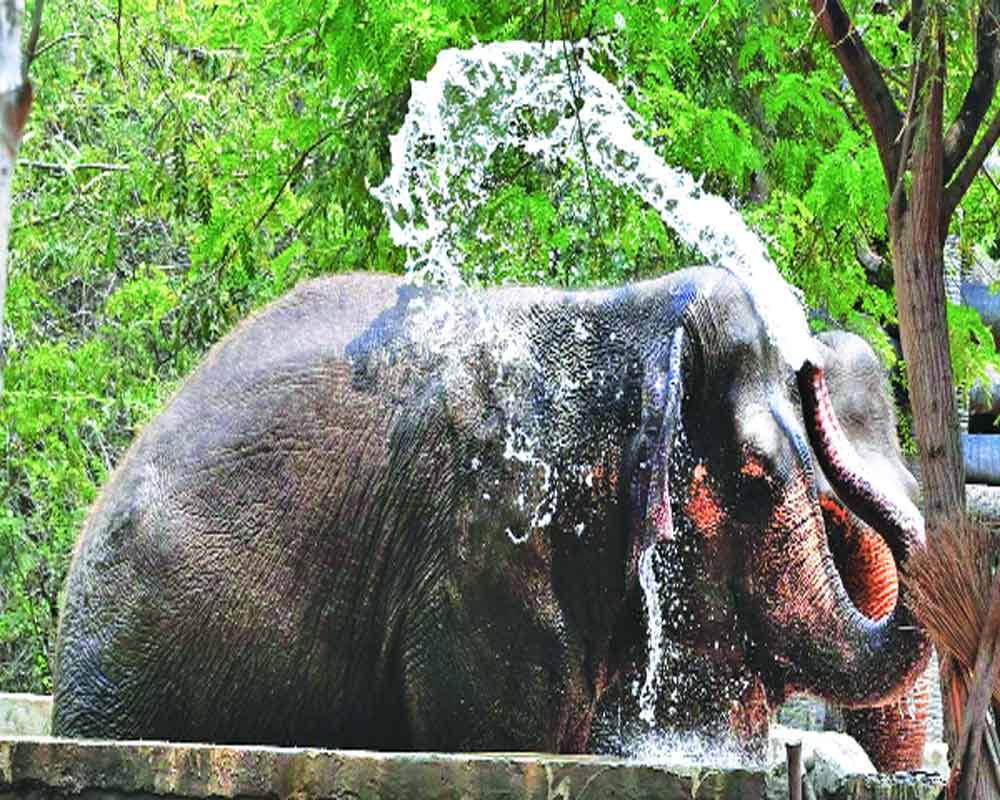As temperatures soar and heatwaves become increasingly common and unbearable in various pockets of the country, the Central Zoo Authority (CZA) has issued urgent advisories to State zoos nationwide to help the resident animals beat the heat and stay calm.
These measures encompass a range of preventive and emergency actions, from providing electrolyte-rich fluids to installing cool shades, misters, and sprinklers, and offering frozen treats with fruits or vegetables in ice to captive animals.
With extreme summer heat expected to intensify across various regions in the coming days, the CZA, an autonomous body under the Union Environment Ministry, has already raised alarms, warning that the current heat wave conditions pose a significant threat to zoo inhabitants, putting them at risk of heat stress, dehydration, and other heat-related illnesses.
They cited the latest advisory from the India Meteorological Department stating that severe heat wave conditions are forecasted to affect extensive areas of eastern India and the Gangetic plain of West Bengal in the upcoming days, potentially surpassing temperature records set in 2023 and making this year the warmest on record. Ditto is with Bihar, Jharkhand and Telangana among few other States.
“It’s crucial to prioritise the well-being of zoo inmates during extreme weather conditions like heat waves,” emphasized officials. The proactive steps being taken to ensure the safety and comfort of captive animals aim to mitigate any potential harm caused by the heat wave. Heat stress in animals is considered to be a violation of animal welfare and rights.
An official from Sepahijala Zoological Park in Tripura’s Sepahijala district mentioned that they have already initiated several measures to ensure the well-being of their animal residents while an official from the Delhi Zoo said that depending on the species, extreme heat can cause significant stress on animals, from tiny reptiles to large livestock like elephants. “So, we look at all the individual animals, at their natural behavior, their history, and even if they are very old or young to determine how they’ll handle the heat. And then we make adjustments to make it cooler for them,” he said.
The CZA has emphasized the importance of providing multiple water sources with fresh, cool water in shaded areas and ensuring frequent refills to maintain constant availability. “Handling or manipulation of animals should be restricted to the cooler part of the day. Nocturnal animals should not be disturbed during the daytime. Electrolytes should be added to drinking water, especially for vulnerable animals or those on restricted diets,” stated CZA Member Secretary Sanjay Kumar Shukla in the advisory issued to all zoos in the country.
Authorities have been advised to improve enclosures with shade cloths, tarps, or trees for natural shade and provide shallow pools for animals to wade and splash in, ensuring safe depths.
For ventilation, while fans for air circulation are recommended, direct blowing on animals should be avoided to maintain their natural cooling. Cool refuges like burrows, caves, or nesting boxes with moistened substrates like soil should be provided for animals to retreat.
“Provide frozen treats with fruits or vegetables in ice. Feed animals during cooler times, like early mornings or evenings. Offer easily digestible, high-moisture foods like fruits and vegetables during heatwaves,” as per the circular.
Authorities have also been directed to avoid inter-zoo transfers of animals during heatwaves to minimize stress. Training staff to recognize signs of heat stress and promptly respond to any issues is crucial.
Besides bringing animals indoors for air conditioning, some zookeepers are turning the inmates to pools, ice, and other cool treats to help lower body temperatures and create enrichment games for all to enjoy.
The Delhi zoo official said that its animal care specialists are always trying out new ways to physically and mentally stimulate the animals during the searing summers. There are 155 CZA-recognized zoos in the country. Karnataka tops the list with 14 numbers of zoos followed by West Bengal (13) and Maharashtra (12).
























